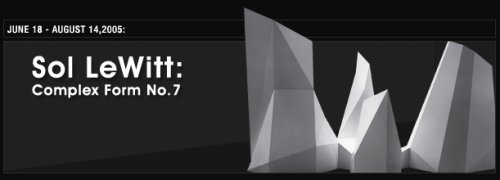Sol LeWitt
dal 17/6/2005 al 14/8/2005
Segnalato da
17/6/2005
Sol LeWitt
Everson Museum of Art, Syracuse, NY
Complex Forms No. 7, a large-scale sculpture that consists of eight module structures, spanning almost seventeen feet, that have been constructed and assembled by assistants according to artist's design specifications. The artistic process is intellectual rather than emotional, as demonstrated by LeWitt's decision to use everyday materials and no color to carry out a complicated design drawing. He donated this work to the Everson Museum in 1993.

Complex Forms No. 7
This summer the Everson Museum will be exhibiting Complex Form No. 7, a large-scale sculpture by internationally known conceptual artist Sol LeWitt. Like most minimalist and conceptual artists, LeWitt emphasized idea over execution. Complex Form No. 7 consists of eight module structures, spanning almost seventeen feet, that have been constructed and assembled by assistants according to LeWitt’s design specifications. The artistic process is intellectual rather than emotional, as demonstrated by the artist’s decision to use everyday materials and no color to carry out a complicated design drawing.
LeWitt donated Complex Form No. 7 to the Everson Museum in 1993. A 1949 graduate of Syracuse University, he returned to campus in 2004 to construct Six Curved Walls (Syracuse) in honor of the inauguration of Chancellor Nancy Cantor. The installation, located on the hillside of Crouse College, consists of a series of six undulating walls made of cinderblocks, each twelve feet high and stretching 140 feet. A third sculpture by Sol LeWitt stands outside the James M. Hanley Federal Building in downtown Syracuse.
While you can take in the work of Sol LeWitt at the Everson this summer, you can also see his work on view at the Metropolitan Museum of Art in New York City, which is featuring an exhibition titled Sol LeWitt on the Roof: Splotches, Whirls and Twirls, on museum's Iris and B. Gerald Cantor Roof Garden through October 30. Visit www.metmuseum.org for more details.
Everson Museum of Art
401 Harrison Street
Syracuse, NY



